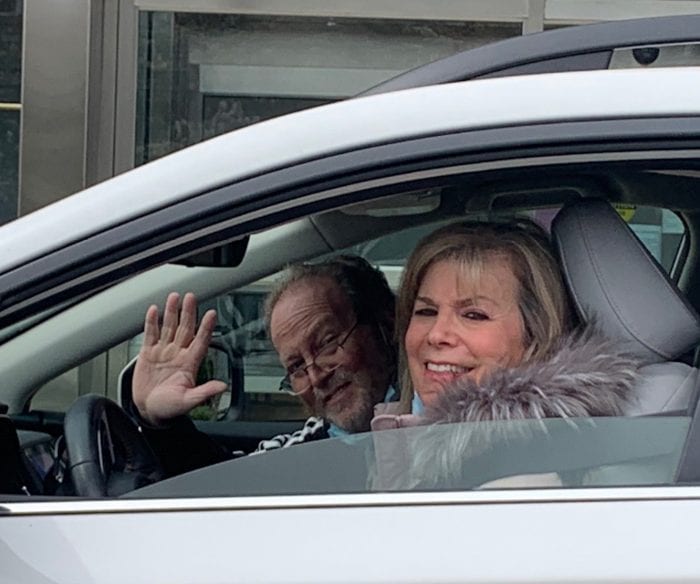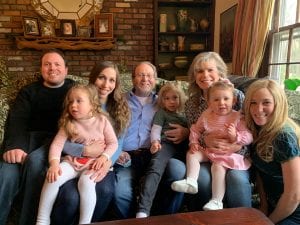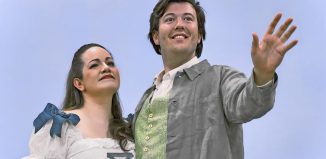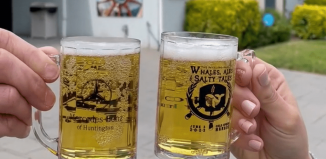Recovered COVID-19 Patient Grateful for Hospital Staff

One Northport resident’s experience with the coronavirus led him to the brink of death, and now that he’s back at home, he’s beyond grateful for those who nursed him back to health.

Scott November, 66, was Huntington Hospital’s first ventilated patient who has survived and recovered from COVID-19. After a journey that took him from at first not being able to be tested for the virus and trying to recoup at home, to a hospital visit that led to him being on a ventilator, November has now put 10 days of rehabilitation and more than a week of at-home quarantine behind him. As of April 24, he was finally able to see family members, even though it was from a distance.
“I was really exceptionally well and lovingly cared for in the hospital,” November said.
The father and grandfather, who is a purchasing and global operations manager for a brass fitting company in Brooklyn, said early in March he attended parties for his grandchildren. He said he was feeling fine, moving tables and kissing and hugging everyone.
The next day he went to work and felt good at the office and driving home at the end of the workday. However, when he arrived home and sat down for dinner, he began to shake violently. He had the chills, and when he took his temperature, he had a fever of 100.6 degrees. He laid down in the guest room and decided to stay in there until he got better as he didn’t want to infect his wife, he said.
Despite trips to two different urgent care facilities, he wasn’t tested for the coronavirus at the beginning of his illness as he wasn’t presenting with all the symptoms, and he was just given flu tests which came out negative.
November, who has psoriatic arthritis and diabetes, said looking back he understands why he wasn’t tested at the time as there weren’t enough tests available. When he made a second trip to one of the urgent care locations, he was given an X-ray to see if he had pneumonia. While the health care professionals there read it as negative, it was sent out to a radiologist who noticed spots on his lungs and saw pneumonia.
November said he took his health in his own hands and spoke with an administrator at the urgent care and his call was passed on to one of the heads of the chain, who went through his information and saw the radiologist’s report. It was then the Northport resident was told to get tested for COVID-19. He was able to get the test March 16, but that night his symptoms worsened. His wife called his primary physician where she was instructed to call an ambulance.
EMT personnel soon showed up in full hazmat uniforms, and he was brought to the emergency room at Huntington Hospital. He said the new emergency center has individual rooms with doors so he was able to be isolated as he was in a room for two days until it was determined he should be taken to the critical care unit and be put on a ventilator. Though, he said, he has no recollection of the move to the CCU as he was in a medically-induced coma.
He called the nurses heroes and added that they can’t practice social distancing like others while caring for patients. All they have between themselves and the patients, he added, are gloves, sheer gowns and face coverings.
“They have to trust that they’ll stay safe,” he said. “They’re heroes. They went beyond the extra mile.”
“It’s so important for families and caregivers to have a bond and have communication. It made me a real person.”
— Scott November
November said he is grateful that his caregivers did everything they could to keep in touch with his family regularly through phone calls and FaceTime and answered their questions about his condition since COVID-19 guidelines prevent visitors at hospitals.
“It’s so important for families and caregivers to have a bond and have communication,” he said. “It made me a real person.”
To make up for the lack of family interaction, the nurses hung up family photos and his grandchildren’s drawings on the hospital room walls. His wife, Shelley, said the health care workers felt her family’s desperation, and at times nurses would fix her husband’s hair and even stroke his head to comfort him.
November said he was told there were several patients in the CCU while he was there, and he witnessed health care professionals scrambling to learn more about the novel virus, even joining online forums to talk to other nurses and doctors around the country.
November is grateful to be alive, he said, as he heard that others on ventilators lost their battles against the virus. Not only that, he almost died himself. His wife had received a call during his stint in the hospital that he was close to death, but the nurses tried one more thing. They heard that putting patients in a prone position helped to increase oxygen intake, and they decided to put him on his stomach. The move worked.
While November was in the hospital, his wife, who is 65, also came down with the coronavirus, though she didn’t need to be hospitalized. She said while she was fortunate not to be admitted to the hospital, it was tough dealing with everything, and when she was at her worst, her husband was also at his. Both she and her husband are grateful that their children Jordan, Courtney and Remy were able to help out, leaving groceries by their mother’s door when she needed to quarantine.
When the husband was finally extubated and able to leave the CCU, he said he had no core strength and wasn’t self-sufficient so he was sent to a rehab facility. Then days after entering rehab, he was able to walk 300 feet, climb three flights of stairs and become self-sufficient enough to use the bathroom and groom himself on his own.
On April 17 he left rehab, and after eight days of quarantining at home, he said he was thrilled to see his family, even if it was from a distance.
“There were prayers to God, to Jesus, to Allah. There were prayers to everybody on my behalf.”
— Scott November
When it comes to getting through the rough times, November said he is a big believer in science and knows everything the doctors and nurses did and all the research being done played a part in his recovery. Calling himself an agnostic, he added he also believes it has something to do with the diverse groups of friends he and his wife, as well as his children, have.
“There were prayers to God, to Jesus, to Allah,” November said. “There were prayers to everybody on my behalf.”
He said his recovery and being able to unite with his family is bittersweet though, because he knows of the many lives that have been lost to the coronavirus. Knowing that he is also concerned for those who have not been able to mourn for their loved ones with funerals and services.
“They’re not a number. Each one of them is a human being,” he said. “Mothers, fathers, wives, husbands, children, grandchildren, coworkers, friends — they have their camaraderie.”
His wife agreed that families are destroyed, and it’s frustrating for nurses who put the same efforts into everyone’s care.
“It’s really hard to understand why he was spared,” she said. “Why did the universe have mercy on us and not others, and it’s hard to live with that.”






